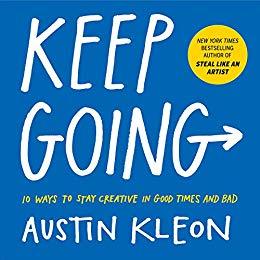More on this book
Community
Kindle Notes & Highlights
“You will find that you have already been gloriously rewarded for your poem. You have experienced becoming, learned a lot more about what’s inside you, and you have made your soul grow.” That, said Vonnegut, was the whole purpose of making art: “Practicing an art, no matter how well or badly, is a way to make your soul grow, for heaven’s sake.”
When nothing’s fun anymore, try to make the worst thing you can. The ugliest drawing. The crummiest poem. The most obnoxious song. Making intentionally bad art is a ton of fun.
“You must practice being stupid, dumb, unthinking, empty. Then you will be able to DO . . . Try to do some BAD work—the worst you can think of and see what happens but mainly relax and let everything go to hell—you are not responsible for the world—you are only responsible for your work—so DO IT.” —Sol LeWitt to Eva Hesse
One of the easiest ways to hate something you love is to turn it into your job: taking the thing that keeps you alive spiritually and turning it into the thing that keeps you alive literally.
All clicks have meant in the short term is that everything online is now clickbait, optimized for the short attention span. The quick hit.
“There is a kind of success worse than failure.”
When you feel as though you’ve lost or you’re losing your gift, the quickest way to recover is to step outside the marketplace and make gifts.
Consider how many bestselling stories began their life as bedtime stories for specific children.
Making gifts puts us in touch with our gifts.
“What I’m really concerned about is reaching one person.” —Jorge Luis Borges
she made common things “uncommon.”
teaching them to crop the world, to “see for the sake of seeing,” and discover all the things that they’d never bothered to notice.
You do not need to have an extraordinary life to make extraordinary work. Everything you need to make extraordinary art can be found in your everyday life.
When your job is to see things other people don’t, you have to slow down enough that you can actually look.
“When people look slowly . . . they make discoveries.”
In 2018, the British Museum started offering pencils and paper to visitors after they noticed an uptick in people interested in sketching the art.
“I feel like you dwell on an object a lot more if you have a paper and pencil before you.”
What you choose to pay attention to is the stuff your life and work will be made of.
We pay attention to the things we really care about, but sometimes what we really care about is hidden from us.
I keep a daily diary for many reasons, but the main one is that it helps me pay attention to my life. By sitting down every morning and writing about my life, I pay attention to it, and over time, I have a record of what I’ve paid attention to.
When you have a system for going back through your work, you can better see the bigger picture of what you’ve been up to, and what you should do next.
If you want to change your life, change what you pay attention to. “We give things meaning by paying attention to them,” Jessa Crispin writes, “and so moving your attention from one thing to another can absolutely change your future.”
Great artists help people look at their lives with fresh eyes and a sense of possibility.
“If people read your work and, as a result, choose life, then you are doing your job.”
The world doesn’t necessarily need more great artists. It needs more decent human beings.
“I am for an art that helps old ladies across the street.”
“The test of a first-rate intelligence is the ability to hold two opposed ideas in the mind at the same time, and still retain the ability to function. One should, for example, be able to see that things are hopeless and yet be determined to make them otherwise.” —F. Scott Fitzgerald
We’re afraid of changing our minds because we’re afraid of the consequences of changing our minds. What will people think?
Uncertainty is the very thing that art thrives on.
“This has been my job in a way,” says screenwriter Charlie Kaufman. “I sit at my desk and I don’t know what to do.”
“I’m making explorations. I don’t know where they’re going to take me.” —Marshall McLuhan
But hope is not about knowing how things will turn out—it is moving forward in the face of uncertainty.
It’s a way of dealing with uncertainty. “Hope is an embrace of the unknown and the unknowable,” writes Rebecca Solnit.
to change your mind is to do some real thinking. Thinking requires an environment in which you can try out all sorts of ideas and not be judged for them. To change your mind, you need a good place to have some bad ideas.


